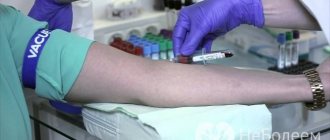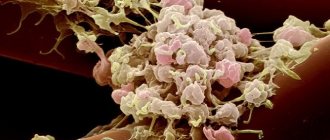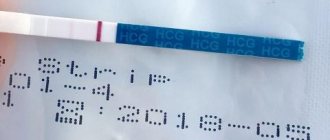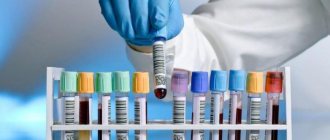The article talks about the procedure for diagnosing oncology, its types, as well as how the obtained indicators are deciphered and how to properly prepare for the test.
Tumor markers are an analysis for identifying a specific protein in the human body by collecting venous blood. The advantage of this method: it can be used to identify cancer cells and pathology at an early stage of development. This significantly increases the chances of recovery. The types of examinations differ.
Tumor markers for women diagnose the mammary glands, ovaries and female reproductive organs, as they are susceptible to the action of antigens. The majority of representatives of the stronger sex suffer from prostate cancer. PSA analysis allows you to detect cancer at an early stage of its development and combat the disease. Other types of tumor markers do not apply to the genitals, but diagnose the concentration of antigens in the stomach, intestines and pancreas.
Types of tests for tumor markers
The content of the article
Tumor marker PSA
. This antigen in a man’s body indicates the development of prostate cancer - PSA is produced by its cells. Having received the results, it is possible to clarify the level of tumor prevalence. PSA tests are the earliest diagnosis of cancer. Therefore, doctors strongly recommend that all men over 40 years old undergo this test, even if at first glance everything is fine with the prostate.
Tumor marker AFP
. This test diagnoses hepatocellular liver cancer at an early stage. The analysis monitors the patient's treatment. This analysis is also used in the field of gynecology: the level of tumor marker during pregnancy indicates the condition of the fetus.
Tumor marker CEA
. This carcinoembryonic antigen is produced by cells of the digestive tract of the embryo and fetus. The substance is practically absent in the body of a healthy adult and pregnant women. Even a slow increase in its concentration allows doctors to determine the development of the oncological process. Through CEA analysis, cancer of the colon and rectum, lung, stomach, pancreas, breast, and thyroid gland is successfully diagnosed. In addition, it is advisable to take an analysis for CEA tumor markers in order to diagnose prostate and ovarian cancer.
Tumor marker CA 125
. The presence of CA 125 in the body indicates ovarian cancer. A blood test for this antigen is necessary to monitor the effectiveness of therapy for various types of ovarian cancer (serous, endometrial, clear cell). The results of tumor marker concentration also make it possible to predict relapse and the formation of metastases within a few months.
Tumor marker CA 15-3
. Testing for this tumor marker is an effective tool for diagnosing breast cancer. The analysis is also needed to check the effectiveness of treatment, to detect relapses, and to detect cancer metastases. The specificity of tumor marker readings makes it possible to accurately determine a malignant formation in the mammary glands.
Tumor marker CA 19-9
. The study diagnoses a malignant neoplasm of the rectum and large intestine. A high level of tumor marker CA 19-9 detects metastases in the early stages and allows monitoring the development of the disease.
Tumor marker thyroglobulin (TG).
Testing for thyroglobulin is a stage in the diagnosis of carcinoma (except for medullary cancer). The analysis is also important for early diagnosis of metastases and calculation of relapse in patients who have already undergone surgery. The value of this tumor marker also allows us to evaluate the effectiveness of treatment.
HCG analysis.
The analysis is carried out to confirm conception, for early diagnosis of genetic abnormalities in the unborn child, detection of uterine cancer, and detection of ectopic pregnancy.
These tumor marker tests are considered the gold standard for cancer diagnosis worldwide.
What to look for when taking cancer tests
Tumor markers for diagnosis are used only in conjunction with other clinical data and mostly for preliminary screening of the disease or monitoring treatment.
An increase in the indicator may be caused by a certain physiological state. Which, for example, is typical for specific proteins of malignant lesions of the ovaries and mammary glands, which increase during menstrual periods.
When preparing for tumor marker analysis, it is very important to follow all the necessary recommendations that are published on the websites of laboratories offering services. Following the recommendations will help you get a reliable result.
If you want to learn in detail professional information on the topic “tumor markers and cancer-specific substances - what are they?”, look at the description of cancer-specific proteins in any international laboratory in your city. The price section for tests contains names, features of preparation for the test and an accurate medical description, which allows you to get an accurate idea of the test prescribed.
AFP analysis: detailed characteristics
Alpha fetoprotein or AFP is a tumor marker used to detect liver cancer. The antigen is characterized by increased sensitivity, the concentration of AFP in the body increases in 95% of patients with liver cancer. Moreover, in half of the cases, the increase in this substance occurs 2-3 months earlier than the first symptoms of the disease appear. AFP analysis is used
and for the purpose of diagnosing other diseases.
What is this - AFP?
AFP is a glycoprotein that is produced in the fetal gall sac, intestinal epithelium and fetal liver. The tumor marker is directly involved in its full development. In the body of adults, the antigen is absent or present in minimal quantities. A slight increase in the tumor marker value may indicate liver pathology, a serious increase may indicate a poorly differentiated tumor, liver cancer. A sharp increase in AFP is characteristic of cancer of the gonads and liver; this study is highly informative for certain tumors of the ovaries and testicles.
Donating blood for AFP tumor markers is prescribed as an additional diagnostic tool if the patient is suspected of having tumor processes in the gallbladder and bile ducts, but in such a situation the analysis is combined with a test for CA 19-9.
Problems solved by AFP analysis
Analysis for the tumor marker alpha-fetoprotein
solves several problems.
- Testing for AFP tumor markers is used for prenatal diagnosis of abnormalities in the development of the unborn child. This may be anencephaly (a pathology in which part of the fetal brain is simply missing), failure of the neural tube, chromosomal abnormalities and other pathologies, which will be indicated by a deviation in the level of AFP concentration in the body of the expectant mother from the norm.
- Donating blood for AFP tumor markers is necessary to diagnose liver cancer (primary hepatocellular carcinoma). (Carry out if indicated).
- AFP testing can detect testicular teratoblastoma.
- Testing for this tumor marker is a tool for diagnosing poorly differentiated tumors.
- The analysis is carried out to detect liver metastases (tumors of various locations).
- AFP testing is a mandatory step in monitoring the effectiveness of cancer treatment.
When is an AFP test prescribed?
A doctor may order an AFP test for a patient in the following situations.
- During a comprehensive examination with a high probability of tumor development (chronic hepatitis, liver cirrhosis, lack of alpha-antitrypsin).
- If the doctor suspects liver damage in a patient due to tumor metastases.
- Before, during and after treatment for certain cancers.
- As part of monitoring the condition of patients who have undergone tumor removal.
- An AFP test can be prescribed in the 2nd trimester of pregnancy (that is, 15-21 weeks), this is an important tumor marker for women.
- Testing for the tumor marker AFP is advisable for pregnant women who have undergone chorionic villus sampling and amniocentesis in early pregnancy.
When performing an AFP test, the patient's blood is examined, which is taken from a vein. The examination is carried out in the morning. The cost and timing of obtaining test results for AFP tumor markers depend on the specific laboratory.
How to prepare for AFP tests
The accuracy of the results of a blood test for AFP is guaranteed if the preparation for the study is followed.
Test results for AFP tumor markers may deviate from the norm not only due to the presence of diseases in patients, but also due to the use of monoclonal antibody drugs. A decrease in the blood concentration of AFP in a pregnant woman can also cause insulin-dependent diabetes.
In order to avoid receiving erroneous test results for the level of AFP tumor markers, the patient must warn the doctor about all the medications he is taking and about all the diseases present. If the patient takes large doses of biotin (exceeding 5 mg per day), an AFP test can be performed only 8 hours after the last use of the drug.
Other preparation rules
Preparing to donate blood for tumor markers involves the following steps.
- 10 days before the blood test for AFP, the patient is recommended to adhere to a certain diet, refusing fatty and fried foods, eggs, chocolate, and confectionery. The menu should be dominated by vegetables, fruits, and cereals.
- It is important to donate blood for AFP testing in the morning and on an empty stomach. If it is not possible to take the test in the morning, you must wait at least 5 hours from the moment of your last meal. Drinks allowed are pure water without gas.
- Three days before the analysis, it is advisable to stop physical activity. It is recommended to devote more time to rest.
- You need to stop drinking alcohol 3 days before; you can start abstaining from cigarettes approximately two hours before the test. Sexual contacts are not recommended for two days.
- If, in agreement with the attending physician, the patient's medication has been suspended, ideally you should wait about 10 days after discontinuation.
- If the purpose of testing for AFP markers in the body is to monitor the effectiveness of treatment, it is best to choose the same hours and the same laboratory for donating blood.
- Medical procedures (instrumental, x-ray examination, massage, etc.) can also distort the results of blood tests for AFP.
What you need to know before the procedure
Before carrying out the analysis, you must be aware of the recommendations of doctors and contraindications to it. Below are some of the most important steps you should avoid to ensure your test results are accurate. Preparation for analysis is as follows:
- It is not recommended to donate blood during the menstrual cycle in women or during inflammatory processes. Changes affecting hormones can distort the results obtained.
- Three days before blood sampling, you should not drink alcoholic beverages. Ethanol quickly penetrates the blood, changing its composition. This will compromise the accuracy of the test results, producing an elevated antigen reading.
- The examination must be carried out in the first half of the day. At this time, the level of antigen concentration is high, so the test performance increases.
- It is recommended to donate blood on an empty stomach, when processes associated with digesting food are not occurring in the body. The blood does not contain impurities or additional substances and is normal. In the morning you are allowed to drink several glasses of water. This will muffle the feeling of hunger, and a feeling of fullness will appear in the stomach.
- Two to three days before the procedure, you should carefully review your diet. Excessive amounts of protein foods will skew the results. It is also important to minimize the consumption of fatty and smoked foods seasoned with a lot of spices.
- You should stop smoking and drinking alcohol. This will affect the accuracy of the indicators.
- Exhaustive physical activity is strongly not recommended during the examination period. It is better to avoid visiting sports complexes, fitness clubs, and playing sports during the test. This will have a beneficial effect on the accuracy of the study.
- Taking medications distorts the examination results. Therefore, it is recommended to stop taking medications three days before blood collection. If stopping medications is not possible, then you should inform your doctor about this.
- If the procedure is performed on a child, it is advised to drink water for half an hour to replenish the volume of fluid in the body.
The results of the analysis are prepared within ten days, depending on the clinic and the complexity of the disease. If a repeat procedure is required, the attending physician will inform the patient. Tumor marker testing is carried out monthly to exclude relapse after therapy, as well as to study the effectiveness and efficiency of the chosen treatment.
Five years after the course of therapy, examinations are carried out once a year. You should donate blood for protein pigment regularly in case of metastases. If high levels are detected, doctors perform a repeat analysis. The diagnosis is not established after a single blood draw. If there are signals of pathology, a comprehensive examination is carried out in order to identify the true cause.
How to decipher an AFP analysis
The normal level of AFP tumor markers in the human body directly depends on his gender and age; reference values are indicated in IU/ml.
| Research | Normal indicators |
| AFP norm for men | Normal values for boys less than a month old are 0.5-13600. For boys from a month to a year, normal results are 0.5 – 23.5. From a year and throughout life for a man, the normal tumor marker AFP is 0.9-6.67. |
| AFP norm for women | For female newborns who are not yet a month old, the norm is 0.5 - 15740. For girls 1-12 months old, normal values can be 0.5 - 64.3. For non-pregnant women, normal results are 0.9-6.67. |
| AFP norm during pregnancy | For expectant mothers, there are their own norm criteria, which vary depending on the week of pregnancy. At weeks 1-12, a normal result is considered to be a value in the range of 0.5 - 15. For weeks 12-15, indicators are 15 - 60. For weeks 15-19, the norm is 15 – 95. At weeks 19-24, normal values are 27 – 125. At weeks 24-28, the indicator should be 52-140. At weeks 28-30, a value in the range of 67-150 is considered normal. The normal result for weeks 30-32 ranges from 100 -250. |
What does an excess of the AFP norm indicate?
An increase in alpha-fetoprotein levels beyond the normal range may be a signal of cancer, obstetric pathology, and so on.
| AFP violation | Diseases |
| Exceeding the norm in oncology | Oncological diseases: liver cancer (hepatocellular carcinoma, somewhere in 70-95% of cases); liver metastases (about 9% of cases); embryonal tumors; testicular cancer (germ cell nonseminoma); tumors of other localizations (pancreatic, breast cancer , kidneys, stomach, intestines, lung). |
| Exceeding the AFP norm in other pathologies | Diseases: primary biliary cirrhosis; chronic or acute active hepatitis (indicator increases slightly, decreases rapidly); alcoholic liver disease; genetic tyrosinemia; liver surgery, liver trauma; Wiskott-Aldrich syndrome; ataxia-telangiectasia. |
| For pregnant women, an increase in the level of AFP tumor markers in the transcript may be a signal of obstetric pathology | Pathologies: umbilical hernia; intestinal atresia, esophagus; developmental failures of the urinary system (polycystic kidney disease, genetic nephrosis, obstruction, absence of a kidney); neural tube defects (in approximately 80-90% of cases, possible anecephaly, spina bifida); cystic hygroma; fetal teratoma;fetal distress;hydrocephalus; multiple pregnancy; pathology of the placenta; threatened abortion; incomplete osteogenesis. |
| What does a decrease in AFP norm mean? | Possible reasons why the level of concentration of the tumor marker alpha-fetoprotein in the patient's body falls below the normal result: obesity of a pregnant woman; hydatidiform mole; intrauterine fetal death; Patau syndrome; Edwards syndrome; Down syndrome. The reduction in AFP values, which is achieved after surgical removal of the tumor, is regarded as a favorable sign and indicates the effectiveness of treatment. |
Where can I get tumor markers and find out information about the norm?
The standards for many tumor markers depend on the method and test system used in the laboratory you choose. Information about the range of tumor marker values will be contained in the analysis results that will be given to the patient in the laboratory. Usually the ranges of values are indicated in the adjacent column, next to the patient's result.
If the indicators are too high, the column is additionally highlighted with a special mark.
If you use the value of the selected tumor markers as estimates of your own health status, for accuracy it is better to take tests using the same methods and test systems.
Reference data for tumor markers can be obtained from the laboratory directly or on the official website.
PSA tests
Antigen (tumor marker) that indicates prostate cancer - PSA (prostate specific antigen). Testing for this substance allows you to detect cancer at an early stage and determine the extent of its prevalence.
Why is a PSA test performed?
An analysis for the level of total PSA in the body can be prescribed to men in the following cases.
- Early diagnosis of prostate cancer, confirmation of the presumptive diagnosis after other types of examination (for example, digital rectal examination, ultrasound).
- Differential diagnosis of prostate cancer, detection of benign hyperplasia of this gland.
- Monitoring the effectiveness of radical prostatectomy for patients with prostate cancer. In such a situation, doctors recommend examinations every three months.
- Evaluation of the effectiveness of conservative therapy, which is carried out for the purpose of non-operative treatment of prostate cancer.
- Examination of patients with prostate cancer to detect relapses of the disease (preclinical).
- Examination of patients with benign hyperplasia, which makes it possible to verify the effectiveness of the treatment and to detect a possible process of malignancy.
Doctors strongly recommend that all males over the age of 40 undergo an annual PSA antigen test. This will allow us to detect the risk of developing the disease at an early stage and begin treatment. The price of a blood test for this antigen is not so high as to risk your own health and even life by refusing diagnostics.
How the research is carried out
Checking the level of PSA concentration for compliance with the norm in the male body is carried out in blood, which is taken from the patient’s vein. Blood is drawn from a man before 11 a.m., which reduces the risk of destruction of the integrity of blood cells. At least 2 ml of biological material is taken. As a rule, total PSA is determined, but if clarification of the presumptive diagnosis is required, the level of free prostate-specific antigen can also be checked.
How to Prepare for a PSA Test
In order for this study to show correct results, the patient must strictly follow the basic rules of preparation for it. Preparation for a test for the level of male PSA markers in the blood is based on the following principles.
- Two days before the test, the man must adhere to a strict diet. Fatty, spicy and fried foods are completely excluded from the menu, and alcohol consumption is not allowed.
- Blood for analysis for the PSA tumor marker is taken exclusively on an empty stomach, the time of the last meal is 12 hours before the test. During this period, a man can only drink clean water without gas.
- Immediately before submitting biological material for research, you need to abstain from cigarettes - at least a couple of hours before the tests.
- A few days before testing the PSA level in the body, you need to start abstaining from sports activities.
- Sexual contacts are completely excluded approximately 5-7 days before the test.
- It is advisable to donate blood for testing before undergoing a urological examination. Or wait about 10 days after it is carried out.
- If the patient has undergone a prostate biopsy, it is necessary to wait at least a month.
- The PSA test, like all other types of tests for tumor markers in the blood, is recommended to be taken in a calm state. Immediately before the analysis, the man should rest and relax.
What should you tell your doctor about?
The patient should inform the doctor about factors that may negatively affect the reliability of the results, since even tests for tumor markers can be erroneous.
- Be sure to report all medications you are taking.
- The patient should inform the doctor about the presence of benign prostatic hyperplasia, prostatitis, and recent medical procedures related to the prostate gland.
Male tumor markers
Men are susceptible to the formation of a malignant tumor in the prostate gland. In the initial stages, oncology does not manifest itself, and dysfunction of the genitourinary organs is associated with other diseases. A tumor marker called PSA is a specific protein of the prostate gland. By examining these cells, an oncological or benign type of prostatitis is detected. For men over the age of forty, it is recommended to undergo an antigen test annually. A person with cancer should undergo regular cancer tests to monitor the spread of metastases in the body.
How to interpret a PSA test
If a patient has prostate cancer, the level of the PSA tumor marker in his body increases significantly. Antigen normal levels directly depend on the patient’s age.
- The norm for men who are in the age group of 17-40 years is a PSA value below 0.33 ng/ml.
- Normal values for men 41-50 years of age are below the maximum permissible limit of 0.42 ng/ml.
- Normal results for men 51-60 years old should not exceed 0.49 ng/ml.
- The norm for elderly men aged 61-90 years is no higher than 0.87 ng/ml.
Reliability of PSA test results
Not in all cases, an increase in the concentration of the PSA tumor marker serves as an indicator of prostate cancer. It has been proven that a certain increase in prostate specific antigen levels can be observed in diseases such as prostate adenoma and prostatitis. In this case, doctors must not only diagnose total PSA; they also check the concentration of its free fraction, as well as the ratio of free antigen to total PSA. The norm for free PSA in the male body is within 0.4-0.5 ng/ml. If a patient has a benign disease, the ratio of total and free PSA is more than 15%. If the patient has an oncological process, this figure will be less than 15%.
Why else can PSA results be distorted?
There may be some deviations in test results for the level of prostate specific antigen from the norm if a man has recently undergone medical manipulation associated with an effect on the prostate. This may be bladder catheterization, prostate massage, cystoscopy, biopsy, rectal digital examination, transrectal ultrasound examination, and so on.
All these factors can lead to a temporary increase in PSA levels in the test results. Nevertheless, a stable and pronounced increase in the concentration of the specific tumor marker PSA in a man’s body in most cases indicates prostate cancer.
What do high PSA values mean?
It is necessary to decipher tests for PSA tumor markers based on how far the indicators go beyond the normal range. If the test results for a prostate-specific tumor marker are significantly increased, this may indicate a suspicion of prostate cancer, an increased risk of developing this disease in the patient, and also that there are cancer metastases in the body.
High values may indicate the following:
- If, as a result of PSA tests, the tumor marker in the male body is 4-10 ng/ml, doctors say that the patient is suspected of prostate cancer.
- If the substance level is in the range of 10-20 ng/ml, an increased risk of developing prostate cancer can be assumed.
- If the value of prostate specific antigen exceeds 40 ng/ml, metastases may be present in the patient's body.
A blood test for the PSA tumor marker is inexpensive, but regular testing will help prevent the development of a dangerous disease.
The concept of tumor marker and its features
The indicators of most tumor markers are used in modern medicine to diagnose cancer.
In most cases, they represent a certain protein structure, substance or antigen; their increased content in the patient sample under study may indicate the presence of a malignant process. However, this is not always the case.
For example, the marker of carcinoembryonic protein (CEA), often used in examinations, can also increase with benign cell changes.
Cancer marker ca-125, which is used to assess ovarian tumors, rises during menstruation and in some reproductive pathologies. Bone phosphatase is often used as a tumor marker for metastases, and this analysis is performed only by a limited number of laboratories, and an increase in alkaline phosphatase can be caused both by damage to the gastrointestinal tract and, for example, by pregnancy.
As a rule, highly elevated tumor markers in human blood are characteristic of advanced stages of cancer. At the first and second stages, normative data are often observed.
In some cases, markers may not rise, so to assess the risk of cancer during the examination, several specific proteins and substances are used, analysis of the content of which in the patient’s sample will provide a more accurate picture and risk assessment.
CEA tests
CEA or cancer embryonic antigen is produced by cells of the digestive tract of the embryo and fetus. The substance is practically absent in the blood of healthy adults and pregnant women. CEA serves as a tumor marker; even a slow increase in its concentration in the body can indicate the development of cancer.
Why do you need a CEA analysis?
Tests for tumor markers are relevant for the purposes of early diagnosis, monitoring of therapy, and the course of the disease in certain tumors. The most popular analysis is CEA
acquired as a tool for detecting rectal and colon cancer, as it is characterized by the greatest sensitivity. Also, the concentration of the substance may increase with cancer of the ovaries, breast, stomach, prostate and so on, metastases to the bones and liver (but the level of sensitivity is lower).
CEA analysis is prescribed for the following purposes:
- Diagnosis, control over treatment of malignant tumors.
- Confirmation of the effectiveness of radical treatment of malignant neoplasms. After surgery to remove a tumor, the CEA tumor marker returns to normal within a couple of months at most; regular tests allow the patient’s further condition to be monitored, with the help of which a relapse is detected in a timely manner.
- Evaluation of the effectiveness of conservative treatment of malignant neoplasms.
- Early diagnosis of cancer recurrence.
Indications for CEA analysis
A study to determine the tumor marker CEA may be prescribed if the patient is suspected of having cancer:
- rectum, large intestine;
- mammary gland;
- pancreas;
- lungs;
- stomach;
- ovaries.
This analysis is also a tool for diagnosing metastases of tumor tissue in the bones and liver. Detect metastases by analyzing the tumor marker CEA
allows approximately 3-6 months before the first clinical signs occur in the patient.
How is CEA analysis carried out?
The analysis is carried out using the immunochemiluminescent method. The object for research is venous blood. It is recommended to take the test in the same laboratory if the purpose of the test is to monitor the effectiveness of treatment. Different laboratories use different research methods, which leads to different results of decoding CEA.
It is important to know
Even if the concentration of the carcinoembryonic antigen CEA in the patient’s body is outside the normal range (in one direction or another), this is not yet considered a reason for diagnosing the patient with cancer. This result is a reason to continue the examination. The CEA indicator often rises above the norm with frequent smoking and drinking alcohol.
How to prepare for CEA analysis
Preparation for a test for cancer embryonal antigen is a prerequisite for obtaining correct results. Before taking a blood test for the CEA tumor marker, the following requirements must be met.
- Two weeks before donating blood for antigen, it is necessary to suspend treatment with medications, as they can cause CEA values to deviate from the norm. If you cannot stop treatment, you must notify your doctor.
- The concentration of the colon cancer tumor marker CEA may increase in the patient’s body not only due to the presence of cancerous tumors, but also due to other diseases (liver cirrhosis, pneumonia, chronic hepatitis, autoimmune diseases, pancreatitis, and so on). The doctor must know about all the diseases that the patient has or has recently had.
- Some medical procedures can also lead to a deviation of the CEA value from the norm. If 7 days before donating blood for analysis, the patient underwent an MRI, X-ray or ultrasound examination, CT scan, etc., the doctor should know about this.
- Three days before the test, you should not drink alcohol, allow significant physical activity (it is better to refrain from sports activities), sexual contacts, or emotional stress.
- A couple of days before the study, you need to carefully prepare your daily menu, abstaining from spicy, fatty, and rough foods.
- A blood test for this tumor marker is taken on an empty stomach. Within 12 hours before the test, it is prohibited to eat or drink sweetened drinks (coffee, juice, tea). You are allowed to drink only non-carbonated clean water, the quantity does not matter.
Before analysis
A blood test for CEA must be taken in the morning, from 7 to 11. The patient is advised to come to the laboratory in advance, rest, sit for half an hour, and adjust emotional balance. It is advisable to abstain from cigarettes 3 hours before the test.
How much can you trust tests?
Tumor markers do not show 100% certainty of diagnosis or the presence of a malignant tumor. Fluctuations in indicators may be due to the development of pathologies, disruption of the gastrointestinal tract, and renal failure. Therefore, in addition to antigen tests, it is necessary to do an examination of the whole body, using complex procedures, this will increase the efficiency of the study.
To decipher the results obtained, qualifications and information content in the field of medicine are required. By independently making a diagnosis, studying codes, standards and indicators of the examination, you can come to false conclusions. You can trust the diagnosis made by the attending physician after a complex of procedures and examinations.
How to decipher the REA analysis
In order to independently understand the test results, the patient must know the normal values of the CEA tumor marker and have an idea of what a deviation from the norm may mean.
The normal levels of this substance are the same for both sexes; the patient’s age also does not play a role. Normally, the concentration of CEA in the body of a man or woman should not exceed 6.5 ng/ml. Normal CEA values in blood serum indicate a low risk of developing cancer. The result may also be due to the fact that the testing is not sensitive to a specific tumor type.
What does exceeding the REA norm indicate?
If the levels of cancer embryonic antigen in the patient’s test results exceed the norm, this may be a signal of the following diseases:
- cancer of the rectum, colon;
- cancer of the stomach, pancreas;
- lungs' cancer;
- mammary cancer;
- cancer of the uterus, cervix, ovaries;
- spread of tumor metastases to bone tissue, liver;
- recurrence of cancer.
An increase in CEA values is not always evidence of the presence of cancer in the patient’s body. The level may also increase due to the development of benign diseases:
- liver cirrhosis, chronic hepatitis;
- chronic renal failure;
- chronic pancreatitis;
- colorectal polyps;
- tuberculosis;
- ulcerative colitis;
- Crohn's disease;
- emphysema, pneumonia, chronic bronchitis;
- autoimmune diseases;
- cystic fibrosis;
- rheumatoid arthritis;
- ovarian and breast cysts.
In addition, a slight increase in the values of the CEA tumor marker in test results is possible if the patient smokes or suffers from alcoholism. A slight increase in the concentration of antigen in the patient’s blood may indicate benign diseases in the acute stage, but the initial stage of the development of cancer cannot be completely excluded.
A serious increase in CEA concentration is observed in the presence of malignant tumors. If metastases are present, the rate can increase tenfold. If the indicators of this tumor marker increase in dynamics, which is detected during repeated tests, this indicates the low effectiveness of treatment directed against the malignant disease, the development of relapse, the onset of metastasis (often detected 3-6 months before the onset of clinical symptoms of metastases).
What can we say about the decrease in REA indicators?
The concentration level of this substance in the patient’s body may also decrease, which usually indicates the following:
- the patient underwent surgical removal of a malignant tumor;
- effective therapy for cancer was carried out;
- the benign tumor is in remission.
It is important to know
A positive result of examining a patient for a tumor marker of cancer embryonic antigen cannot yet be considered as a sufficient basis for making a medical verdict. This is just an indicator for further examination. Also, a negative CEA test result does not at all prove that the patient does not have cancer.
It is also worth considering that research methods in different laboratories may differ, which leads to different results. Therefore, doctors recommend repeat testing in the same medical center where the first analysis for the CEA tumor marker was done. The price of research for the CEA tumor marker depends on the specific laboratory.
<
p style=”text-align: justify;”>
What is achieved during the examination
Blood contains protein antigens. They are found in moderation in every healthy body. But when a benign or malignant tumor forms, the indicators exceed the permissible norm. The amount of specific proteins also increases when pathologies of the kidneys, liver, stomach or genitourinary system occur. A specially developed table of indicators, given below in the article, allows you to determine the nature of the disease in cancer.
If negative indicators are detected, additional examinations are prescribed. Thus, the malignant type of formation and pathologies of internal organs are diagnosed in the early stages, which are eliminated thanks to timely treatment. In advanced stages of the disease, when cure is impossible, complete remission and elimination of pain symptoms are achieved.
Appointment with a urologist
Published: 01/02/2017
Urology is an area of medical practice that studies diseases of the genitourinary system. An appointment with a urologist is necessary when the patient experiences any symptoms indicating a malfunction of these organs. At the same time, the urologist consults and treats not only men, as many believe. The competence of this specialist includes infectious, inflammatory, tumor, traumatic and many other […]
Prostate-specific antigen: prostate risk assessment
Standard values (for men):
- up to 40 years: up to 1.4;
- 40-50 years: up to 2.0;
- 50-60 years: up to 3.1;
- 60-70 years: up to 4.1;
- over 70 years old: up to 4.4.
The antigen is used to assess the condition of the prostate; it increases in all types of lesions - inflammatory and benign, and especially increases in malignant oncological processes.
Microglobulin in urine Beta 2
Standard values: from 0 to 300 ng.
Urinary microglobulin Beta 2 is assessed in clinical practice only when it is elevated. In some cases, it can be observed with tumor damage to the kidneys. Microglobulin Beta 2 tests are done frequently during treatment. Its increase is characteristic of some non-tumor kidney diseases and in the event of kidney implant rejection.
Oncologist appointment
Published: 01/02/2017
Oncology is the field of medicine that studies the causes and processes of development of malignant tumors. The first step to cancer treatment is seeing an oncologist and diagnosing the symptoms. The main task of this section of medical practice is to decipher the mechanisms of formation and spread of a cancerous tumor, as well as to develop methods for reliable diagnosis and effective treatment of such pathological conditions.
[/su_posts]
If you find an error, please select a piece of text and press Ctrl+Enter
Alpha-fetoprotein: liver tumor marker
Standard values: 0.90 - 6.67 units/ml (men and non-pregnant women).
The tumor marker AFP is used as a test value that evaluates the level of serum fetal protein that is produced during the embryonic period.
In adults and non-pregnant women, the value is constant and significantly less than in infants and pregnant women.
An increase in alpha-fetoprotein can be observed in malignancies and has been observed in liver cancer. Also, its increase can occur with benign neoplasms.
Leading clinics in Israel
Assuta
Israel, Tel Aviv
Ikhilov
Israel, Tel Aviv
Hadassah
Israel, Jerusalem
Tumor markers for women have the following clinical significance:
- Detection of malignancy in combination with other diagnostic examination methods;
- Determination of malignancy or benignity of a neoplasm, its type, location, stage of the tumor process;
- Comparative assessment of markers before, during and after treatment makes it possible to judge the effectiveness of anticancer therapy;
- Disease control, early detection of relapses and the presence of metastases (six months before the onset of symptoms).
It should be noted that a certain amount of tumor markers is present in the blood of healthy people.
Sometimes exceeding normal values is provoked by various physiological or pathological reasons not related to oncology. Female tumor markers can increase during menstruation, pregnancy, acute and chronic inflammatory diseases, and benign tumors. For this reason, deciphering the analysis should be carried out exclusively by an oncologist, comprehensively assessing all external factors and indicators (the dynamics of marker growth, content level, etc.), as well as taking into account the results of other examination methods.
What tumor markers should a man take for prevention?
All of the tests mentioned below (if performed correctly) help detect the presence of malignant cells several months before they are detected by standard diagnostic methods.
Main tumor markers:
- "AFP" - makes it possible to determine the presence of pathological changes in the male testicles.
- PSA is a male tumor marker used to detect prostate cancer. It is also used to diagnose chronic inflammation in a given area of the body, which helps provide timely treatment.
When these indicators increase significantly, this is the first sign of the presence of cancer.
Preparing for analysis
It is necessary to clarify that this procedure must be taken very seriously. If the patient does not adhere to the rules, the result may be erroneous and the analysis will have to be retaken. Therefore, doctors advise following the following recommendations to ensure that the results of tumor markers are correct:
- A week before the expected date of testing, it is advisable to remove chips, crackers, store-bought juices, sweet soda, as well as smoked fish and sausages from your diet. All of the above products contain dyes, stabilizers and artificial flavor enhancers. If they are in the blood in large quantities, they can provoke an incorrect result.
- Before taking the test, you need to bring your psycho-emotional state back to normal. If the patient is under stress, certain hormones are released. They also affect the appearance of protein structures in the blood. Therefore, before starting blood sampling, you need to have a good rest and not be nervous.
- To obtain correct tumor marker results, it is necessary to temporarily eliminate smoking and alcohol.
- Three days before the appointed date, you must stop taking any pharmaceuticals, herbal teas, infusions and decoctions.
- It is required to take tests from 8-00 to 12-00. The procedure must be carried out on an empty stomach. You can only drink a glass of water without gas or additives.
Who needs analysis and when?
Screening tests should be carried out 1-2 times a year for those patients who have a genetic predisposition, benign neoplasms, suspicious papillomas and moles. Other people can be tested no more than once every two years, and also:
• after severe nervous strain; • when living in unfavorable environmental conditions; • under other circumstances that may cause cancer.
People are recommended to do screening tests more often:
• with a diagnosis; • with a treated malignant tumor; • upon initial detection of a neoplasm; • before and after surgery; • during a course of therapy.
Those who have recovered are recommended to check their tumor marker levels within 3 years after treatment is completed:
1. First year – every month. 2. Second year – once every two months. 3. Third year – once every three months. Subsequent years are analyzed every six months. Before screening, the patient must visit an oncologist, who will find out which markers need to be tested for.
Thyroid cancer
As already mentioned, a tumor marker is a protein secreted by cancer cells and some healthy cells. It is found in both urine and blood. For thyroid cancer, blood is donated for the following tumor markers:
- "Calcitonin" - may be present in the patient's blood or urine. Used in the diagnosis of modular cancer. Its concentration depends on the formation and period of the pathological process.
- “Thyroglobulin” is a protein that collects in the follicles of the thyroid gland. It is the main marker in the diagnosis of relapse of malignant tumors.
- “CEA” (carcinoembryonic antigen) – with thyroid disease, the tumor marker increases. It is determined only in blood serum.
Degree of reliability of markers in oncology
Analysis of the content of these substances is very informative for assessing the prescribed therapeutic course for cancer. In primary diagnosis, none of them is used independently. This is due to the lack of specificity of the markers.
The reliability of the readings of specific proteins can be considered using the example of the most common of them. These include the PSA test. This tumor marker should be tested in men for timely detection of prostate cancer. In case of malignant tumors of the gland, this indicator actually exceeds the norm. But it also increases if a benign neoplasm forms in the prostate. As medical practice shows, prostate cancer was not confirmed in most men with elevated PSA levels.
Attention: there are cases when unscrupulous doctors in dubious clinics prescribe unnecessary therapeutic procedures. They not only require serious financial investments, but can also provoke serious complications!
Another indicative marker is CA-125. It grows in the blood of women who have ovarian cancer, but can increase in a large number of other pathologies not related to oncology.
Medicine knows of cases when, in the late stages of the formation of malignant neoplasms in the ovaries, a blood test did not show deviations in the results of any of the 28 protein compounds specific to this disease.
CA-125 is not recommended for testing in the initial stages of the disease in the absence of characteristic symptoms. To analyze the course of the diagnosed pathology, it is considered together with other proteins, as well as ultrasound results.
As part of a comprehensive examination, women with poor heredity or gene mutations need to take tumor markers every six months.
In general, the question of how much one can trust tumor markers remains open today. When interpreting research results, you should pay attention to a number of factors that can distort the data:
- the level of protein content is affected by inflammatory diseases in acute or chronic form;
- CA-125 increases during menstruation;
- smokers are characterized by a twofold increase in the CEA index;
- A normal test result does not guarantee the absence of a tumor.
These are the most common nuances, but there may be other “subtleties”. Only a qualified doctor who can correctly decipher the results can understand them.











